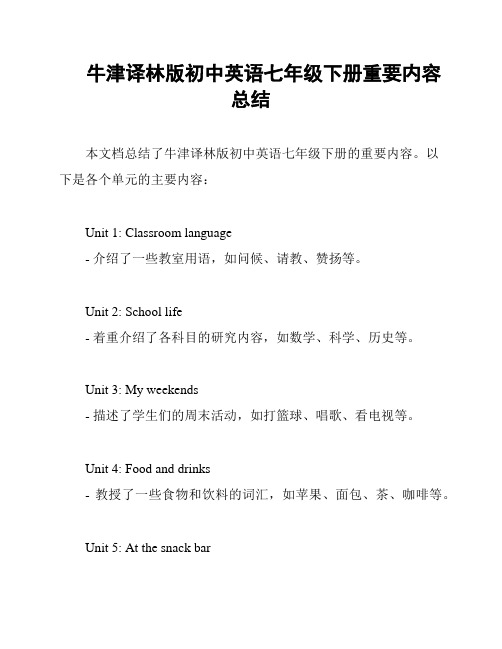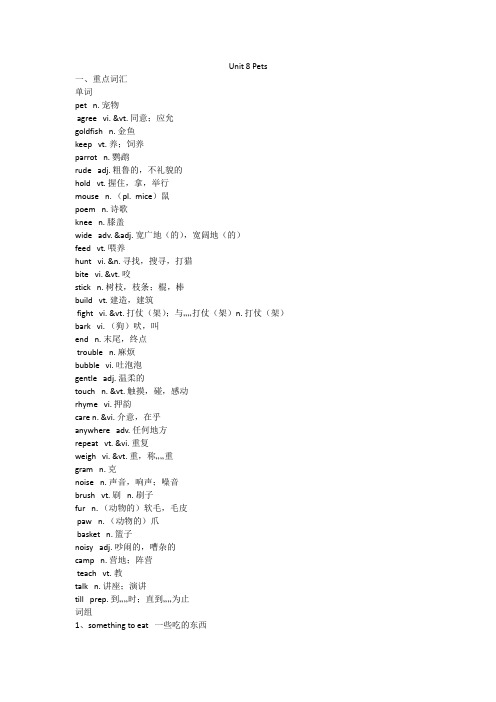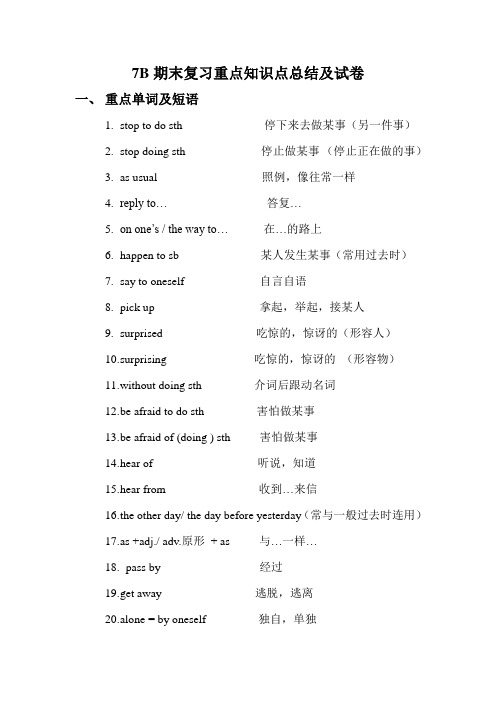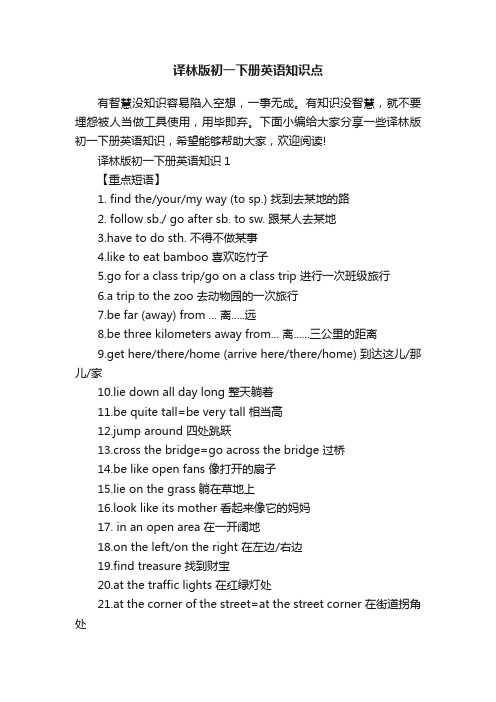七年级下英语知识点 译林
牛津译林版初中英语七年级下册重要内容总结

牛津译林版初中英语七年级下册重要内容
总结
本文档总结了牛津译林版初中英语七年级下册的重要内容。
以
下是各个单元的主要内容:
Unit 1: Classroom language
- 介绍了一些教室用语,如问候、请教、赞扬等。
Unit 2: School life
- 着重介绍了各科目的研究内容,如数学、科学、历史等。
Unit 3: My weekends
- 描述了学生们的周末活动,如打篮球、唱歌、看电视等。
Unit 4: Food and drinks
- 教授了一些食物和饮料的词汇,如苹果、面包、茶、咖啡等。
Unit 5: At the snack bar
- 研究了在小吃店点餐的常用句型,如“What would you like?”、“Here you are.”等。
Unit 6: Festivals and celebrations
- 介绍了一些重要的节日和庆祝活动,如春节、圣诞节、生日等。
Unit 7: Hobbies
- 研究了各种爱好和运动,如阅读、游泳、踢足球等。
Unit 8: At the zoo
- 通过描述动物的外貌和生活性,使学生了解不同的动物种类。
Unit 9: My body and health
- 关注了身体部位和健康问题,如头、肚子、感冒、发烧等。
Unit 10: My family
- 描述了家庭成员的关系和工作,如爸爸、妈妈、姐姐、弟弟等。
这些是牛津译林版初中英语七年级下册的重要内容总结。
希望能对您有所帮助!。
Unit 2 知识点梳理-牛津译林版七年级英语下册

牛津译林版七下Unit 2 知识点梳理1.Where are you going?你要去哪儿?现在进行时表将来。
现在进行时可用于表示计划或安排将要发生的动作,go,come,leave等表示位移的动词,都可以用现在进行时表示将来。
2.I’m going to visit our new neighbours. 我打算去拜访我们的新邻居。
neighbour “附近的人或物”(侧重指人)neighbourhood “邻近街区,居民区”(侧重指地方)3.I’m afraid they won’t welcome visitors like you. 恐怕他们不会欢迎像你这样的客人。
I’m afraid + (that) 从句. “恐怕……”,常有“抱歉”之意。
I’m afraid not.(恐怕不是)I’m afraid so.(恐怕如此)be afraid to do sth.“害怕/不敢去做某事”be afraid of sb./sth.“害怕某人/某物”be afraid of doing sth. “害怕/担心做某事”be afraid for “为……担心”visitor:n. “访问者,参观者”动词加-er或-or变成名词,表示从事该职业的人。
like:prep. “像……一样,相似”。
反义:unlikelook like “看起来像”;be like “像”辨析:like/aslike:强调“如同……一样,如……一般”。
用于相似关系,即两者在形态上或者性质上有相似之处,但并不等同。
as:表示“以……的身份;作为”。
用于说明同一关系,即两者实为一体。
作动词,“喜欢”。
like doing sth.“喜欢做某事”。
4.How many buildings are there in your neighbourhood? 在你的居民区里有多少幢楼?how相关短语:how much:“多少”,提问物品价格或不可数名词。
牛津译林版七年级下英语知识点总结

牛津译林版七年级下英语知识点总结1."Would you like to do something?"Positive answer: "Yes。
I'd/we'd like/love to."Negative answer: "I'd/we'd like/love to。
but。
" or "Sorry。
I'm/We're afraid not."2."Next to" means near or beside.3."One" refers to any one of the same type of thing ned earlier。
"It" refers to the same thing ned earlier.4."Be from" means to come from.5."The capital of" refers to the capital or provincial capital ofa place.6."Around the world," "in the world," and "all over the world" all mean globally.7."Enjoy oneself," "have a good time," and "have fun doing something" all mean to have a good experience doing something.8."In the centre of" means in the middle of.9."Share something with someone" means to use or enjoy something together.10."Look out" means to look outside。
七年级英语知识点归纳总结译林

七年级英语知识点归纳总结译林七年级英语知识点归纳总结一、语法知识点1. 一般现在时用于谈论经常性的、习惯性的行为、事实和真理。
构成:主语+动词原形。
2. 一般过去时用于谈论过去的事情或者动作。
构成:主语+动词过去式。
3. 现在进行时用于表示现在正在进行的动作或状态。
构成:主语+be动词+动词-ing。
4. 祈使句用于命令或请求别人做某事。
构成:动词原形。
如:Sit down.(坐下)5. 一般将来时用于表示将要发生的动作或状态。
构成:主语+will+动词原形。
6. be动词的用法表示状态:构成:主语+be动词。
如:I am happy.(我很开心)表示存在:构成:主语+be动词。
如:There is a cat.(有一只猫)表示职业、国籍、性别等特征:构成:主语+be动词+形容词。
如:He is a teacher.(他是一名教师)二、词汇知识点1. 数字one,two,three,four,five,six,seven,eight,nine,ten。
2. 常见颜色red(红色),blue(蓝色),yellow(黄色),green(绿色),pink(粉色),purple(紫色)。
3. 人体部位head(头),face(脸),eye(眼睛),nose(鼻子),ear(耳朵),mouth(嘴巴),hand(手),foot(脚)。
4. 常见动物dog(狗),cat(猫),pig(猪),duck(鸭子),chicken (鸡),monkey(猴子)。
5. 其他常见词汇school(学校),book(书本),pen(笔),desk(书桌),chair(椅子),bag(书包)。
三、听力技巧1. 记重点短时间内听到很多英语单词,要学会抓住关键要点,快速理解主旨,不要卡住细节。
2. 注意细节重点理解关键词,并注意数字、颜色、时间等细节。
3. 学会捕捉重复很多英语单词会在文章中反复出现,要学会捕捉这些重复出现的单词。
七年级英语重点知识点总结译林版

七年级英语重点知识点总结译林版一、单词与词组1.常用动词be,have,do,go,eat,drink,buy,play,like,study等2.常用名词book,desk,chair,pen,pencil,bag,student,teacher,school,classroom等3.常用形容词good,bad,big,small,happy,sad,young,old,new,expensive等4.常用介词in,on,at,under,over,to,from等5.常用副词well,badly,fast,slowly,often,always,sometimes等6.常用连词and,but,or,so,because等7.日常用语hello,hi,goodbye,thank you,please,sorry,excuse me等8.时间与数字days of the week,months of the year,dates,time,numbers等二、语法知识1.单数与复数英文中名词有单数和复数之分,一般加-s表示复数。
2.第三人称单数动词的变化第三人称单数动词用于他、她、它等主语。
3.一般现在时的用法表示现在正在进行的动作、现在的状态、常规的动作等。
4.动词的时态与语态英文中动词有现在、过去、将来等时态,有主动语态和被动语态。
5.形容词与副词的比较级与最高级形容词和副词有比较级和最高级之分。
6.名词所有格用于表述物品或人物所属关系的语法形式。
7.情态动词can,could,may,might,must,shall,should,will,would 等。
三、阅读理解1.阅读理解题型多数为短文阅读,需要读懂文章,并根据相关问题回答问题、填空等。
2.题目类型题目类型包括细节理解、主旨理解、推断判断等形式。
3.常用解题方法注重文章温度、关联词等细节信息,全面理解整个文章的主旨。
四、写作表达1.书信格式与写作书信的格式一般包括信头、称呼、正文、结束语、署名。
七年级苏教译林版英语下册知识点汇总unit 8

Unit8Pets一、重点词汇单词pet n.宠物agree vi.&vt.同意;应允goldfish n.金鱼keep vt.养;饲养parrot n.鹦鹉rude adj.粗鲁的,不礼貌的hold vt.握住,拿,举行mouse n.(pl.mice)鼠poem n.诗歌knee n.膝盖wide adv.&adj.宽广地(的),宽阔地(的)feed vt.喂养hunt vi.&n.寻找,搜寻,打猎bite vi.&vt.咬stick n.树枝,枝条;棍,棒build vt.建造,建筑fight vi.&vt.打仗(架);与……打仗(架)n.打仗(架)bark vi.(狗)吠,叫end n.末尾,终点trouble n.麻烦bubble vi.吐泡泡gentle adj.温柔的touch n.&vt.触摸,碰,感动rhyme vi.押韵care n.&vi.介意,在乎anywhere adv.任何地方repeat vt.&vi.重复weigh vi.&vt.重,称……重gram n.克noise n.声音,响声;噪音brush vt.刷n.刷子fur n.(动物的)软毛,毛皮paw n.(动物的)爪basket n.篮子noisy adj.吵闹的,嘈杂的camp n.营地;阵营teach vt.教talk n.讲座;演讲till prep.到……时;直到……为止词组1、something to eat一些吃的东西2、repeat my words重复我的话3、sleep on my knees睡在我的膝盖上4、all the time一直,总是5、hold sth in one’s hand某人手里握着某物6、in the sun在阳光下7、teach sb to do sth教某人做某事8、weigh up to40grams重大约40克9、with eyes open wide睁大眼睛10、grow up成长;长大成人11、build me camps out of sticks用树枝为我搭建营地12、make any noise发出任何噪音13、look after照顾14、brush her fur给她刷毛15、look around for me四处找我16、sleep in a basket睡在篮子里17、take care of照顾二、句型大集合1、Bring me my lunch.把午餐给我带来。
牛津译林版英语七年级下册units5-8期末复习重点知识点总结和试卷

7B期末复习重点知识点总结及试卷一、重点单词及短语1.stop to do sth 停下来去做某事(另一件事)2.stop doing sth 停止做某事(停止正在做的事)3.as usual 照例,像往常一样4.reply to…答复…5.on one’s / the way to…在…的路上6.happen to sb 某人发生某事(常用过去时)7.say to oneself 自言自语8.pick up 拿起,举起,接某人9.surprised 吃惊的,惊讶的(形容人)10.s urprising 吃惊的,惊讶的(形容物)11.w ithout doing sth 介词后跟动名词12.b e afraid to do sth 害怕做某事13.b e afraid of (doing ) sth 害怕做某事14.h ear of 听说,知道15.h ear from 收到…来信16.t he other day/ the day before yesterday(常与一般过去时连用)17.a s +adj./ adv.原形+ as 与…一样…18.pass by 经过19.g et away 逃脱,逃离20.a lone = by oneself 独自,单独21.t hrough 穿过,通过(空间)go through 通过…22.p ut up 搭,竖立23.c entury ----centuries 世纪,百年24.e xcited/exciting 分别形容人和物25.e nough 足够的(放于名词前,形容词后)be enough to do sth26.t oo… to太…而不能…27.d ecide to do sth 决定做某事28.r each sth 伸手(脚)够到29.f ail to do sth 做某事失败30.s end sb sth= send sth to sb 发送…给…31.b e able to do sth= can/could 能/会做某事32.p ay for…为…付款33.r aise sth for sb 为…筹集/募集…34.r aise sth to do sth 募集…做某事35.s ave…from…从…救出…36.b e badly hurt 伤的很重37.p rotect…from doing sth保护…免于….38.p ut it out 把它扑灭(代词放中间)39.i n hospital 住院40.i n the hospital 在医院41.n od—nodded (过去式)点头42.n ews (不可数) 新闻,消息43.b y the way 顺便说说44.n o problem 没问题45.d o/try one’s best to do sth尽某人最大努力做某事46.c areful---careless(反义词)47.d o well in doing=be good at doing sth 擅长做某事48.a t the age of…在…岁的时候49.r ecommend sb for…推荐某人获得…50.t ake part in 参加(节目,游戏,活动)51.l ose one’s way = get lost迷路52.t each sb (代词用宾格)sth 教…(代词用宾格)53.t each sb to do sth 教某人做某事54.b ark at sb 对某人叫/吠55.l ook after…well=take good care of…照顾好…56.h ave trouble doing sth 做某事很困那/麻烦57.a ll the time 一直,总是58.a gree with sb 同意某人的观点agree to do sth 同意做某事59.w eigh up to…重达…60.g row up 成长,长大61.t alk= speech 演讲(可数)62.n oisy---noisily adv. 嘈杂的/地(变y为i加ly)期末复习试卷一、单项选择1. She is 11-year-old girl and enjoys playing chess.A. an; anB. a; theC. an; /D. the; /2. Everybody is too tired. Let's a rest.A. stop havingB. to stop havingC. stop to haveD. stop to have3. He was to hear of the news this morning.A. surprising; surprisedB. surprised; surprisingC. surprised; surprisedD. surprising; surprising4.She met her old friend the other day.A. on her way to homeB. on her way homeC. in my way homeD. in my way to home5.The big fire in Australia was at last.A. put inB. put outC. put upD. put down6.Lots of students couldn’t hear the teacher on Ding ding(钉钉)A. enough clearlyB. clearly enoughC. enough clearD. clear enough7.The sunshine went the window, so the whole room was bright.A. acrossB. overC. throughD. past8.--- I can’t reach the book on the shelf, can you help me?--- .A. Never mindB. No problemC. That's all rightD. That's OK9.He did n’t ___________ his pen-friend and he missed her very much.A. heard fromB. hear ofC. heard ofD. hear from10.Many people have _ to do because of the disease Corona vi(新型冠状病毒).A. everythingB. somethingC. anythingD. nothing11.Doctor Zhong nanshan says it still _______ long time to cure(治愈) the diseaseA. spendB. costC. payD. take12.The Eiffel Tower, a ____________ tower, is 130 years old this year.A. 324 metres tallB. 324-metres-tallC. 324-metre-tallD. 324-metre tall13.She felt very sad because she ___________ in the middle-term exam.A. reachedB. failedC. hitD. entered14.The small giraffe is too short the leaves on the tree.A. to reachingB. to reachC. reachingD. not to reach15. good news! The doctors found the medicine to cure the disease!A. HowB. What aC. WhatD. How a二、完形填空阅读下面短文,掌握其大意,从每题所给的A. B. C. D四个选项中,选出最佳选项。
译林版初一下册英语知识点

译林版初一下册英语知识点有智慧没知识容易陷入空想,一事无成。
有知识没智慧,就不要埋怨被人当做工具使用,用毕即弃。
下面小编给大家分享一些译林版初一下册英语知识,希望能够帮助大家,欢迎阅读!译林版初一下册英语知识1【重点短语】1. find the/your/my way (to sp.) 找到去某地的路2. follow sb./ go after sb. to sw. 跟某人去某地3.have to do sth. 不得不做某事4.like to eat bamboo 喜欢吃竹子5.go for a class trip/go on a class trip 进行一次班级旅行6.a trip to the zoo 去动物园的一次旅行7.be far (away) from ... 离.....远8.be three kilometers away from... 离......三公里的距离9.get here/there/home (arrive here/there/home) 到达这儿/那儿/家10.lie down all day long 整天躺着11.be quite tall=be very tall 相当高12.jump around 四处跳跃13.cross the bridge=go across the bridge 过桥14.be like open fans 像打开的扇子15.lie on the grass 躺在草地上16.look like its mother 看起来像它的妈妈17. in an open area 在一开阔地18.on the left/on the right 在左边/右边19.find treasure 找到财宝20.at the traffic lights 在红绿灯处21.at the corner of the street=at the street corner 在街道拐角处22.in the corner of the room 在房间角落里23.prepare sth. for sb. 为某人准备…24.plenty of /lots of food and drinks 大量的食物和饮料25.get out at Exit A 在A出口处出来start at 2 p.m. on Sunday ,21 April在4月21日,星期天下午两点开始译林版初一下册英语知识2【重点句型】1.Would you like to live in a palace ?你想住在宫殿里吗?2.The capital of France is Paris.法国的首都是巴黎。
- 1、下载文档前请自行甄别文档内容的完整性,平台不提供额外的编辑、内容补充、找答案等附加服务。
- 2、"仅部分预览"的文档,不可在线预览部分如存在完整性等问题,可反馈申请退款(可完整预览的文档不适用该条件!)。
- 3、如文档侵犯您的权益,请联系客服反馈,我们会尽快为您处理(人工客服工作时间:9:00-18:30)。
七年级下英语知识点译林
作为初中生英语教材的代表,译林教材一直备受关注。
其中,七年级下册译林英语教材涵盖了大量英语知识点,本文将对其中一些重要的知识点进行介绍。
一、动词时态
1. 一般现在时:表示现在的状态或经常性的动作。
例如:I often go to school by bike. (我经常骑自行车去上学。
)
2. 现在进行时:表示正在进行的动作。
例如:She is watching TV now. (她正在看电视。
)
3. 一般过去时:表示过去发生的事情或状态。
例如:I went to the zoo last week. (我上周去了动物园。
)
4. 过去进行时:表示在过去某个时候正在进行的动作。
例如:He was playing football at six o'clock yesterday evening. (昨天晚上6点他在踢足球。
)
二、冠词用法
1. 定冠词the:用于特定的、明确的人或事物上。
例如:The sun is shining brightly. (太阳正照得很明亮。
)
2. 不定冠词a/an:用于泛指的人或事物。
例如:I bought a book yesterday. (我昨天买了一本书。
)
三、形容词比较级
1. 表示两者之间的比较:用more + 形容词的原级。
例如:Tom is more intelligent than his brother. (汤姆比他的哥哥更聪明。
)
2. 表示三者及以上的比较:用most + 形容词的原级。
例如:She is the most beautiful girl in our class. (她是我们班最漂亮的女孩。
)
四、情态动词
情态动词包括can、could、may、might、must、shall、should、will和would,它们在句子中起到表示能力、可能性、必要性、意
愿等方面的作用。
1. can/could:表示能力或可能性。
例如:I can speak Chinese. (我会说中文。
)
2. may/might:表示可能性。
例如:It may rain tomorrow. (明
天可能会下雨。
)
3. must:表示必要性或推测。
例如:You must finish your homework before you go out to play. (你必须在出去玩之前完成你
的作业。
)
五、疑问句
疑问句是以疑问形式提出的句子,用于询问信息或获得肯定或
否定的回答。
在正式的疑问句中,要将助动词放在主语之前,动
词要用原形。
例如:Do you like coffee? (你喜欢咖啡吗?)
六、倒装句
倒装句指将句子中的语序颠倒,把谓语动词提到主语之前或将助动词放在主语之前。
例如:Not only did he pass the exam, but he also got an A. (他不仅通过了考试,而且还得了A。
)
七、间接引语
间接引语指的是通过引述方式来表达某个人的话或思想,在介绍时要用介词“that”或其他引语词引导。
例如:She said that she was not feeling well. (她说她身体不太舒服。
)
总之,这些知识点是七年级下册译林英语教材的重要内容,掌握它们将为学生的英语学习奠定坚实的基础。
